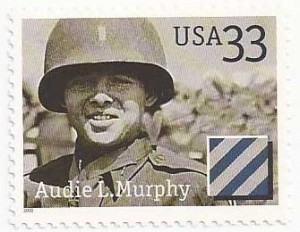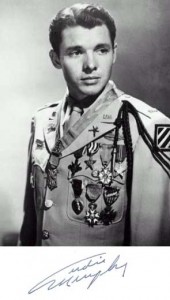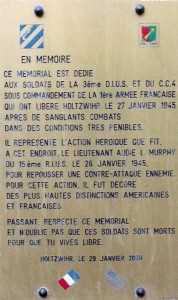 Audie Leon Murphy est né le 20 juin 1924 à Kingston, au Texas, et décédé lors d’un accident d’avion le 28 mai 1971. Il était d’une modeste famille de dix enfants d’ouvriers agricoles. Après de courtes études, il s’engage dans l’infanterie où il sera l’un des soldats les plus décorés de la Seconde Guerre Mondiale. Il obtint le rang de Second Lieutenant d’infanterie et reçut 33 médailles dont la Croix de Guerre et la Légion d’Honneur Françaises, la Congressional Medal of Honor pour son héroïsme lors des combats dans le bois de Riedwihr pour réduire la poche de Colmar. Il servit donc sous les ordres du Général de Lattre et fut un Rhin et Danube. (voir le chapitre : la camaraderie de combat americano-française.)
Audie Leon Murphy est né le 20 juin 1924 à Kingston, au Texas, et décédé lors d’un accident d’avion le 28 mai 1971. Il était d’une modeste famille de dix enfants d’ouvriers agricoles. Après de courtes études, il s’engage dans l’infanterie où il sera l’un des soldats les plus décorés de la Seconde Guerre Mondiale. Il obtint le rang de Second Lieutenant d’infanterie et reçut 33 médailles dont la Croix de Guerre et la Légion d’Honneur Françaises, la Congressional Medal of Honor pour son héroïsme lors des combats dans le bois de Riedwihr pour réduire la poche de Colmar. Il servit donc sous les ordres du Général de Lattre et fut un Rhin et Danube. (voir le chapitre : la camaraderie de combat americano-française.)
Un jour glacial de janvier 1945, il se retrouva commandant de la Compagnie B, qui avait subi de lourdes pertes, attaqué par 6 tanks et des vagues d’infanterie. Il ordonna à ses hommes de se replier dans un bois pour préparer des positions tandis qu’il restait à l’avant dans son poste de commandement d’où il continua à diriger les tirs d’artillerie par téléphone.
Derrière lui, à sa droite, un tank-destroyer U.S. reçut un coup direct et commença à brûler. Son équipage se replia dans le bois. Le lieutenant Murphy continua à diriger l’artillerie et une grande partie de l’infanterie ennemie qui s’avançait fut détruite. Tandis que les tanks ennemis étaient à son niveau le Lieutenant Murphy grimpa sur le tank-destroyer en train de brûler, qui risquait d’exploser à tout moment et employa la mitrailleuse lourde de calibre .50 contre l’ennemi. Il était seul et exposé de trois côtés au feu allemand, mais son feu meurtrier tua des douzaines d’Allemands et fit avorter leur attaque d’infanterie. Les tanks ennemis, perdant leurs support d’infanterie, commencèrent à reculer.
Pendant une heure, les Allemands essayèrent d’éliminer le Lieutenant Murphy avec toutes les armes disponibles, mais il continuait à tenir sa position et anéantit une escouade qui essayait de ramper inaperçue sur son flanc droit. Les Allemands s’approchèrent à 10 mètres mais furent couchés par son feu (Une anecdote : on lui demandait si les allemands étaient proches et il répondit : « Je leur passe mon téléphone et ces bâtards vont vous répondre eux-mêmes. »). Il fut blessé à la jambe, mais n’en tint pas compte et continua le combat tout seul, sans aucune aide, tant qu’il lui resta des munitions.
Il rejoignit alors sa Compagnie, refusa l’intervention médicale et organisa une contre-attaque qui obligea les Allemands à se retirer. Ses directives aux feux d’artillerie anéantirent une grande partie de l’ennemi : 50 tués ou blessés. Le courage indomptable du Lieutenant Murphy et son refus de lâcher un pouce de terrain sauva sa Compagnie d’un encerclement et d’une destruction possibles, et permit de tenir le bois qui avait été l’objectif de l’ennemi.
Un monument est élevé à sa mémoire au coin de ce bois où eut lieu le combat.
La paix revenue, Murphy se retrouva à Hollywood et devint une star dans une vingtaine de film B, une récompense offerte au héros par une nation reconnaissante
◊
AUDIE MURPHY, THE MOST DECORATED US ARMY SOLDIER OF WORLD WAR II, WAS A « RHIN & DANUBE »
Audie Leon Murphy was born on June 24, 1924, in Kingston, Texas, and died in a plane crash on May 1971. He came from a humble family of farm laborers and was one on ten children. After a limited education, he enlisted in the infantry, where he would become one of the most decorated soldiers of World War II. He earned the rank of second infantry lieutenant and received 33 medals, among which the Croix de Guerre, the Légion d’Honneur and the Congressional Medal of Honor for his heroic conduct during the battle of Riedwihr Wood, part of the fight to reduce the « Colmar pocket ». He served under Général de LATTRE and was a « RHIN et DANUBE. » (See the chapter : « The Franco-American Combat Fellowship »)
Audie Murphy represented the great strength of American character.
Citation : Second Lieutenant, Company B, 15th Infantry, 3rd Infantry Division
Place and date : Near Holtzwihr, France, January 26, 1945.
On a freezing day, in The Colmar Pocket, Second Lieutenant Murphy was commanding Company B, severely reduced after heavy casualties, when they were attacked by six tanks and wawes of infantry, 200 German troops. Lieutenant Murphy ordered his men to withdraw to prepare positions in a wood, while he remained forward at his command post and continued to give fire directions to the artillery by telephone.
Behind him, to his right, one of our tank destroyers received a direct hit and began to burn. Its crew withdrew to the woods. Lieutenant Murphy continued to direct artillery fire which killed large numbers of the advancing infantry. With the enemy tanks abreast of his position, Lieutenant Murphy climbed on the burning tank destroyer, which was in danger of blowing up at any moment, and used his .50 caliber machine gun against the enemy. He was alone and exposed to German fire from three sides, but his deadly fire killed dozens of Germans and caused their infantry attack to waver.
The ennemy tanks, losing infantry support, began to fall back. For an hour the Germans tried every available weapon to eliminate Lieutenant Murphy but he continued to hold his position and wiped out a squad wich was trying to creep up unnoticed on his right flank. The Germans were only 10 yards away, only to be mowed down by his fire. (When asked over the wire how close the enemy was, he wisecracked, « Just hold the phone and I’ll let you talk to one of the bastards. ») He received a leg wound, but ignored it and continued the single-hand fight until his ammunition was exhausted.
He then made his way to his company, refused medical attention, and organised the company in a counterattack which forced the Germans to withdraw. His directing of artillery fire wiped out many of the ennemy ; he killed or wounded about 50. Lieutenant Murphy’s indomitable courage and his refusal to give an inch of ground saved his company from possible encirclement and destruction, and enabled it to hold the wood which had been the enemy’s objective.
His heroic stand won him the Congressional Medal of Honor.
An Audie Murphy Monument is located near Holtzwihr at the edge of the forest where he fought.
In peacetime, Murphy drifted to Hollywood to became a star in about twenty « B » movies, the monetary reward offered to a hero by a grateful nation. Murphy steadfastly avoided efforts to sensationalize his war record, saying repeatedly, « The real heroes are all dead. »



